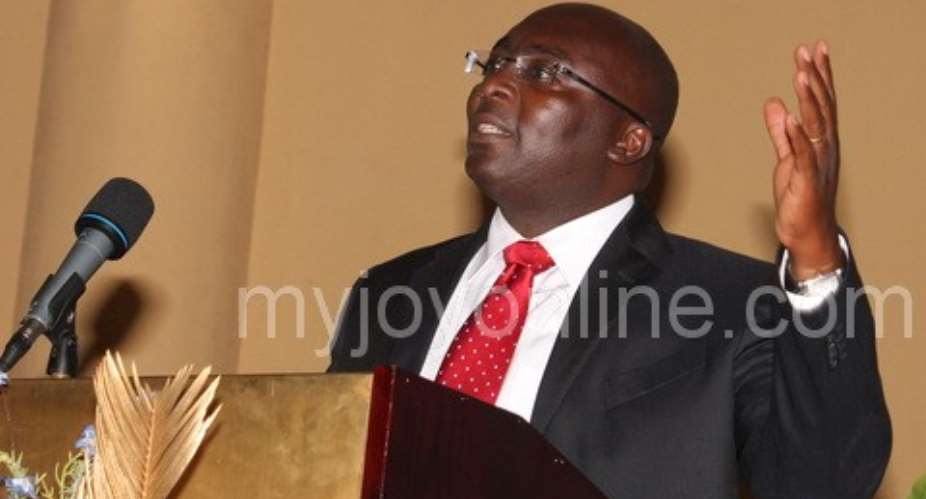The 2015 budget as presented to Parliament last week by Finance Minister Seth Terkper demonstrates clearly government has no clue how get out of the fiscal mess it plunged the economy.
This is the verdict of Dr. Mahamudu Bawumia, 2016 Vice Presidential Candidate of the NPP on the government's financial and economic policy statement for next year.
“The 2015 budget demonstrates one thing for sure. The NDC government has created a fiscal mess after 6 years in office but has no clue how to deal with it,” he told the UK Branch of the Young Executives Forum of the NPP in Milton Keynes on Saturday.
Dr. Bawumia, reports say, thrilled the partisan audience with his remarkable insight on the Ghanaian economy, and used the opportunity to do an elaborate review on the 2015 Budget presented by the Finance Minister on Wednesday, November 19, 2014.
“The government's focus is on raising revenue to hide the fiscal indiscipline. However, it is clearly more of an expenditure mismanagement problem. The budget does not address expenditure review and re-composition and measures to ensure fiscal discipline, but rather focuses on the revenue side (raising more taxes), clearly being insensitive to the population and taxing them to hide inefficiencies. There is a saying that 'if all you have is a hammer everything begins to look like a nail.' This is so appropriate in the case of this NDC Government,“ he said.
Dr. Bawumia referred to the 17.5percent Petroleum Tax and said it showed how the government was totally lost in its handling of the current economic crisis.
“This Special Tax on petroleum products is bound to also increase the already high cost of doing business in the country. At the time when many businesses are having to pay for diesel to run generators as a result of load-shedding, they are being asked to pay more taxes on fuel. This would increase the cost of production.
“We strongly believe that that this tax measure is unwarranted. If the deep seated waste and reported corruption in payroll maladministration is corrected swiftly, enough savings could accrue to the budget and this tax measure could have been avoided. If the leakages are not plugged, then no amount of tax increases would solve the problem,” the former Deputy Governor of the Bank of Ghana observed.
Dr. Bawumia also touched on the taxes imposed on the financial and real estate sectors as examples of how the government had totally gotten it wrong in its approach to correcting the mess it has created.
“In the 2014 budget the Government pushed through against sound arguments, a VAT on fee-based financial services. The confusion surrounding its implementation resulted in the withdrawal of the policy measure. In their desperation to raise tax revenues, the 2015 budget states that this VAT on fee-based financial services will be implemented. This is a bad policy for the economy. Ghana's financial system is underdeveloped with only some 20% of the population having a Bank account. What the government should rather be doing is providing some incentives for financial inclusion. The introduction of VAT on fee-based financial services would only serve to drive people away from the banking system with the attendant reduction in financial savings. It will also increase the cost of doing business for the business community”, he said.
Speaking on the Real Estate sector, Dr. Bawumia noted that, “Some statistics on the property market in Ghana would be instructive in placing this VAT on real estate transactions in context. First, Ghana currently has the highest mortgage to income ratio (at 605%) in the world. In terms of House Price to Income ratio, Ghana is the 10 th highest in the world. In terms of housing affordability, Ghana ranks as the least affordable property market in the world. Given these facts, it is clear that the real estate industry in Ghana needs help. Government should rather be trying to encourage the development of the mortgage market through tax incentives for real estate developers and better land administration. A 5% VAT on real estate transactions is the wrong way to go."





 Akufo-Addo commissions Phase II of Kaleo solar power plant
Akufo-Addo commissions Phase II of Kaleo solar power plant
 NDC panics over Bawumia’s visit to Pope Francis
NDC panics over Bawumia’s visit to Pope Francis
 EC blasts Mahama over “false” claims on recruitment of Returning Officers
EC blasts Mahama over “false” claims on recruitment of Returning Officers
 Lands Minister gives ultimatum to Future Global Resources to revamp Prestea/Bogo...
Lands Minister gives ultimatum to Future Global Resources to revamp Prestea/Bogo...
 Wa Naa appeals to Akufo-Addo to audit state lands in Wa
Wa Naa appeals to Akufo-Addo to audit state lands in Wa
 Prof Opoku-Agyemang misunderstood Bawumia’s ‘driver mate’ analogy – Miracles Abo...
Prof Opoku-Agyemang misunderstood Bawumia’s ‘driver mate’ analogy – Miracles Abo...
 EU confident Ghana will not sign Anti-LGBTQI Bill
EU confident Ghana will not sign Anti-LGBTQI Bill
 Suspend implementation of Planting for Food and Jobs for 2024 - Stakeholders
Suspend implementation of Planting for Food and Jobs for 2024 - Stakeholders
 Tema West Municipal Assembly gets Ghana's First Female Aircraft Marshaller as ne...
Tema West Municipal Assembly gets Ghana's First Female Aircraft Marshaller as ne...
 Dumsor is affecting us double, release timetable – Disability Federation to ECG
Dumsor is affecting us double, release timetable – Disability Federation to ECG
